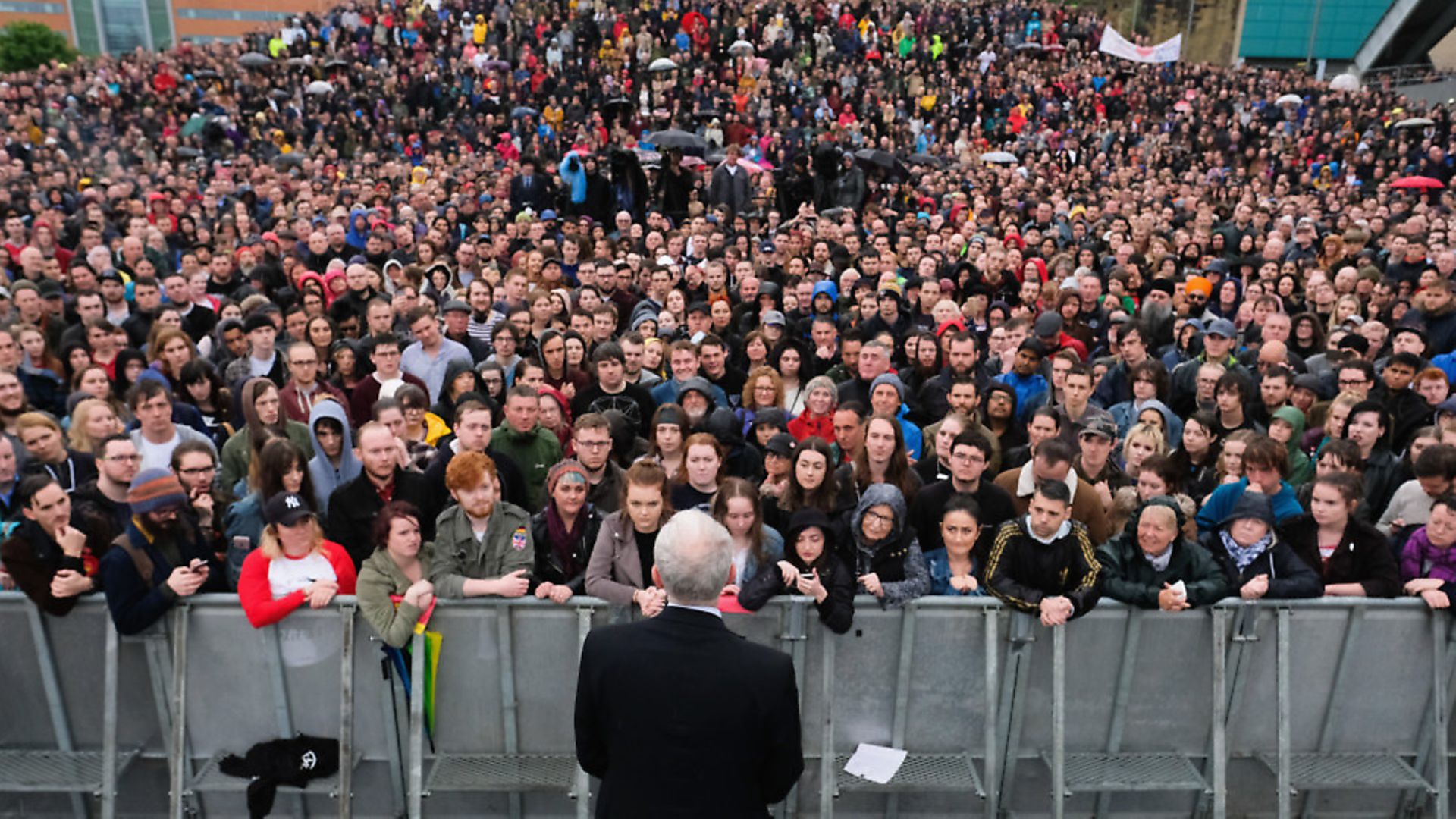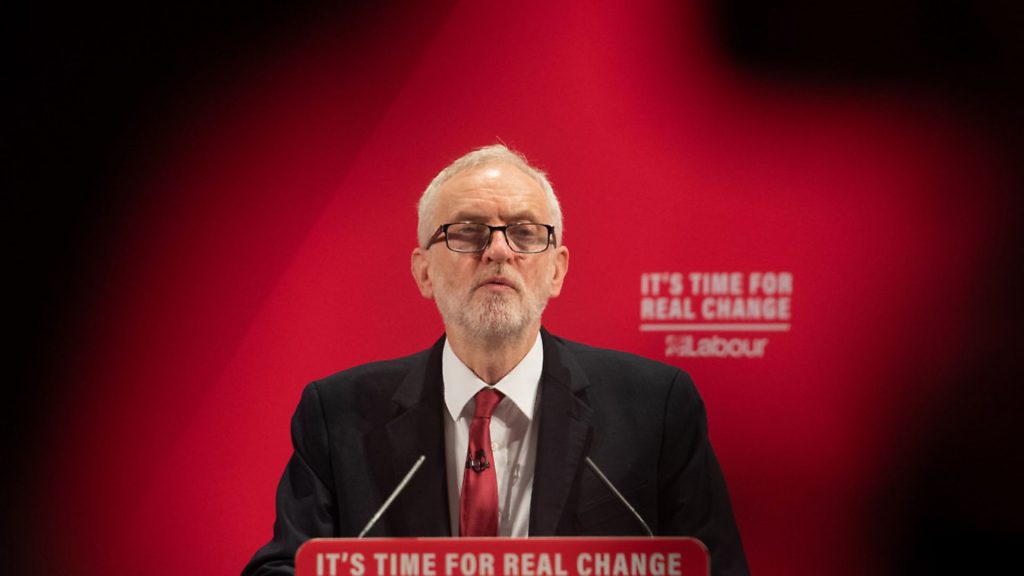
The Labour leader’s apparent equivocation over Brexit might be derided… but it might just be a masterstroke, argues STEVE RICHARDS.

This is a noisy midwinter election. Labour has unveiled a blizzard of policies in its manifesto, so many proposals that they obscure the powerful argument that underpins them.
Labour’s programme is based on an idea about the good that government can do. The idea is swept away by the avalanche of pledges.
Boris Johnson attempts the opposite approach, marching loudly towards his Promised Land without a detailed route map after the publication of the thinnest manifesto in modern times.
Adding to the familiar voices there is a cast of characters in this campaign that could form a modern Monty Python sketch, from Stormzy to the Chief Rabbi. Yet few voters listen attentively. Polls do not seem to be moving very much.
The one slogan that appears to resonate in some parts of the UK is the Tory message, ‘Let’s Get Brexit done’, repeated by Johnson many times an hour on the campaign trail. Although there is an accessible simplicity to the slogan the words are deeply misleading.
If the Conservatives win an overall majority, Brexit will be far from done. Yet Jeremy Corbyn’s alternative position, that he would remain neutral while delivering a referendum between Remain and a soft Brexit, is derided across the political spectrum: What weakness! What a lack of leadership! Corbyn is a Brexiteer! Corbyn’s policy is incomprehensible!
The frustrations with Corbyn are understandable. The election being contested on the eve of the latest historic Brexit deadline, January 31, lacks big figures putting the case for Remain and highlighting the dangers of Johnson’s deal.
There is the partial exception of Nicola Sturgeon who can frame an argument, even if her framing on Brexit is partly diluted by an understandable desire on her part to link the calamity with independence. Corbyn does not try to put the case for Remain and as a weak advocate has failed also to forensically demolish Johnson’s Brexit deal. The failure leads without a moment’s pause to an attack on his seemingly vacuous alternative.
The onslaughts are as shallow as the puny claims that Johnson would get Brexit done. However weak it might seem on the surface, Corbyn’s proposition on Brexit is potentially transformative.
If Labour were to form an administration of some form after December 12 the dynamics of the Brexit debate would be unrecognisably different. Suddenly, after three years of a seemingly eternal nightmare, the UK would be in a different place, still burdened by many Brexit-related challenges but with some hope at last.
Before explaining the scale and nature of the transformation that Corbyn’s ‘neutrality’ could bring about it is necessary to point out that what UK leaders say about Europe has different consequences to what they appear to be implying.
There are endless examples of words uttered pointing in one direction while leading to another. To take a case from recent history, before the 1997 election both the prime minister, John Major, and the Labour leader, Tony Blair, pledged to hold a referendum on whether the UK should join the single currency.
On the surface they were nobly advocating an act of direct democracy to decide a major constitutional and economic change. In reality both leaders were deciding with their referendum pledges that the UK would not be part of the single currency, at least in the first wave.
Neither of them would have been in a position to risk a make-or-break plebiscite so early after the 1997 election, given that the single currency was launched in 1999.
Those that wanted to keep the option of membership open knew this, which is why Ken Clarke and Michael Heseltine agreed only with deep reluctance to support Major’s referendum offer and Gordon Brown had doubts on Labour’s side. This was before Brown became a convinced opponent of the UK joining the euro. Such are the multi-layered ambiguities in the UK when it comes to the EU, leaders’ words rarely mean what they seem to mean.
Fast-forward to the current election where Corbyn’s words appear to be pathetically, chunkily evasive, abdicating leadership as the Liberal Democrats put it. But step back and consider the ‘dividing line’ over Brexit in this election. If Johnson is re-elected on December 12 the eternal Tory dance over Brexit will start up again almost immediately. There will be a new civil war between ‘an EU trade deal versus no-deal’.
Soon after 10pm on December 12, Steve Baker, Mark Francois and others from the ERG group will be out and about on live election programmes hailing Brexit and demanding that Johnson does not extend the trade talks beyond the end of next year. Instead they will demand the UK leaves with no deal if necessary. The trade talks would probably begin in March. By July, Johnson will have to decide whether or not to ask for an extension. He has promised not to do so. The familiar cliff’s edge would be back with the same chorus of voices that have shaped Brexit over the last few years.
Trade is the cause of schisms in the Conservative party from the Corn Laws in the 1840s to seismic rows over protectionism and on to Europe now. Get ready for another internal battle.
Corbyn’s so-called neutrality would lead to an entirely new framing of the Brexit debate. Most Labour figures would campaign for Remain. Some would back a Norway-style Brexit, one that would not be a UK-busting, economy-wrecking Brexit.
This option would take the form of the soft Brexit that many assumed would be the outcome when David Cameron, the inadvertent architect of this national emergency, left Number 10. Even Cameron worked on an assumption that the final outcome would be closer to Norway than what Theresa May and then Johnson went on to negotiate.
As the fate of three Tory prime ministers has been defined by Brexit perhaps it would be healthier for the UK for a prime minister for once to be above the fray. It could not be much worse. Oddly those who argue that Corbyn’s judgement cannot be trusted on anything are now up in arms that he is not telling us all what to do if there is a referendum.
While it is true his position is not as subtle or smart as Harold Wilson’s in the 1975 referendum, the two very different Labour leaders are not that far apart.
Wilson was neutral on the issue of continued membership during the two 1974 elections, which he won, but backed ‘remain’ after a ‘renegotiation’ in 1975. Wilson did not play a high profile role in the 1975 referendum and declared himself ready to implement the result whatever the outcome.
Corbyn’s own personal views on Brexit I suspect are confused, though no one can know for sure except perhaps those who work closely with him. Given that his hero is the late Tony Benn, an opponent of UK membership, part of him probably feels deeply disturbed at the prospect of becoming a key navigator towards Remain.
Yet when Diane Abbott and John McDonnell have sought to persuade him that Brexit is project of the right, and in some cases the far-right, he gets the point. Before the 2016 referendum he had several conversations with the former Greek finance minister, Yanis Varoufakis, in order to convince himself that there was a left-wing case for Remain.
At the same time he wants to retain the support of Labour-voting Brexiteers and Remain equivalents. Given all these calculations he might be genuinely neutral between a soft Brexit and Remain, while agreeing with other parties and senior Labour figures that Johnson’s Brexit deal poses huge economic and constitutional risks. We can speculate about his inner thoughts on the issue but his motives do not matter. Outcomes are what matter. Corbyn offers a route to Remain through a referendum. Labour Remainers, Lib Dems and others were urging Corbyn to back a referendum.
For a long time he was reluctant to do so. But they have prevailed. There is a way through the nightmare. It will be tough. Indeed the prospect of a referendum should fill us all with horror but it is a lot less horrific than a hard Brexit. That is the fundamental choice at the election.
Future historians will struggle to make sense of much that shapes the fragile, angry UK. What would bewilder them most would be for Remain voters to facilitate a hard Brexit by not voting tactically in a way that leads towards a different route. The election is the last chance to avoid the cliff’s edge and with it an outbreak of euphoric English nationalism. At one minute past ten on December 12 the UK will be heading towards a hard Brexit and years of turmoil over a future EU trade deal or a less treacherous route that includes the possibility of staying in.
Corbyn’s apparent abdication of leadership has the potential to become an act of historic significance. To revive another of Harold Wilson’s favourite phrases, at least he “keeps options open”. If Remainers fail to vote tactically the historic act will take a very different form.
– Steve Richards’ latest book is The Prime Ministers-Reflections on Leadership from Wilson to May










